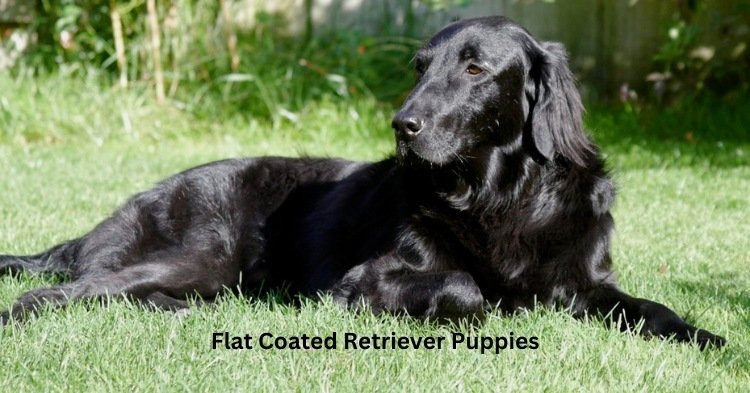Flat-coated retriever dogs are getting more and more popular among individuals and companies as they seem appealing and sociable. These canines are the most energetic, sharpest, and prettiest pals available. Along with discovering Flat Coated Retriever pups, this book addresses training, feeding, and caring for them.
Training Flat Coated Retriever Puppies
- Great Intelligence: Given their intelligence and drive to please, flat coated retrievers are very trainable.
- Start with Basics: Start with basic instructions such as “sit, “stay,” and “come.”
- Positive Reinforcement: Motivational tools for your dog include food, compliments, and play time. Positive reinforcement is shown in studies to be more successful than punishment and to strengthen a relationship.
- Consistency is Key: Create a consistent training schedule with brief, interesting sessions.
- Many Sessions: Studies show that short, regular courses of instruction are more successful than lengthy, infrequent ones.
- Make it Fun: Use games and modify the workouts to keep your dog engaged and driven.
Best Flat Coated Retriever Puppy Food
Healthy growth of Flat Coated Retriever dogs depends mostly on what they eat. Select a premium dog meal heavy in vital minerals. Search for food especially designed for big breeds as these formulations provide the correct mix of vitamins, lipids, and protein required for development.
See your veterinarian to assist in customizing the meal for your puppy’s particular requirements. Depending on the age, weight, and degree of activity of your puppy, they may advise feeding schedules and quantity amounts. If you feed them human food or table scraps, it could lead to nutritional deficits and health problems.
Finding Flat Coated Retriever Puppies for Sale
When looking for Flat Coated Retriever pups for sale, give top priority to locating honest breeders following moral standards. Responsible breeders provide thorough history on their pups and health checks. Reputable breeders may be found using websites such as the American Kennel Club (AKC) and breed-specific groups.
Alternatively, think about adopting from neighbourhood shelters or breed-specific rescues. Many pups find loving homes much needed, hence adopting may be a fulfilling experience. Adoption services may give background information on the dog and often have thorough medical records.
Caring for Flat Coated Retriever Puppies
- Veterinary Exams: Set up regular checkups with the vet to keep an eye on your puppy’s health and growth. Make sure they keep current on prophylactic parasite treatment and immunisations.
- Socialization: Early on expose your Flat-Coated Retriever to several settings, people, and other animals. This guarantees a well-adjusted adult dog and helps to develop confidence and adaptation, therefore preventing behavioural problems.
- Grooming: Frequent brushing of your puppy’s silky coat can help to avoid matting and lower shedding. Bathing should be done as required with a moderate dog shampoo. Use grooming sessions to look for parasites or skin problems.
Behavior and Temperament
Puppy flat-coated Retrivers are renowned for their extroverted and happy nature. Usually friendly, energetic, and loving, they make great family dogs. Their great vitality calls for consistent exercise and intellectual challenge. Puppy physical and psychological requirements may be met by including them in retrieve, agility training, or interactive play.
Their friendliness makes them suitable for other animals as well as for kids. Still, early socialising is essential to making sure kids develop into flexible and well-adjusted adults. Often sensitive to teaching, their excitement and need to please make them easy targets for bonding with your puppy.
Growing Apartment Flat Coated Retriever Puppies
If done well, raising flat coated retriever puppies in an apartment may be challenging but under control. Given their great energy, one must provide consistent exercise and mental stimulation. Interactive toys, play sessions, and daily walks can help keep your dog occupied and ward against boredom.
Treat-dispensing games and puzzle toys may provide mental stimulation as well as help stop negative habits. Your dog will adjust to apartment life if you set a schedule with frequent playfulness and exercise. Moreover helping to create a harmonic living environment is constant training and well defined limits.
Conclusion
With their sociable and vivacious nature, Flat coated retriever pups are great additions to any house. Positive training techniques with incentives and encouragement help you and your dog develop a solid relationship. Key to making sure kids develop into well-adjusted adults are consistent training and socialising. Likewise crucial is giving them a well-balanced meal tailored to their requirements, thus supporting their general health and development.
Whether via adoption or from a breeder, be sure you are ready for the obligations of puppy ownership when selecting a Flat-Coated Retriever. Choose reliable breeders that give ethical behaviour and health top importance, or think about adopting from shelters. Your Flat coated retriever will become a loyal and loving friend who brings you joy and happiness if you train, feed, and take care of it properly.
FAQs
What are typical Flat coated retriever puppy health issues?
Flat coated retrievers may have hip and elbow dysplasia and cancer. A good breeder who looks for health problems and regular veterinarian visits helps avoid these issues.
Should I give my Flat coated retriever dog regular grooming?
Weekly brushing helps your Flat Coated Retriever’s coat stay tangle-free and lowers shedding. If bathed too frequently, their coat will dry out.
Are apartments suitable for Flat Coated Retrievers?
Yes, they could! Just provide them walks, activities, and toys to keep them physically and intellectually busy.
How best should a puppy with a flat coat be socialised?
Show your dog gradually locations, people, and creatures. Classes in puppy socialisation might also help them adjust.
My Flat coated retriever dog should eat what?
Feed your puppy as directed on the container, then modify it for activity and growth. A veterinarian can assist with changes in diet.
Stay connected and updated with – PetsGators.com!







